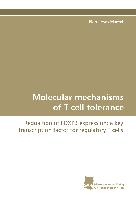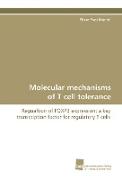Molecular mechanisms of T cell tolerance
BücherAngebote / Angebote:
Regulatory T cells (Tregs) play an important role in immune homeostasis, by maintaining tolerance to self-antigens and allergens as well as by limiting inflammatory tissue damage during chronic infections. Humans or mice lacking the Treg-associated transcription factor FOXP3 develop severe features of autoimmunity and allergy. Ectopic FOXP3 expression endows non-regulatory T cells with many of the hallmarks of regulatory T cells and transgenic reporter mice carrying a FOXP3-GFP indicated that FOXP3 expression correlates with suppressive T cells. Although Tregs can be generated in the thymus, their induction is observed in the periphery. The molecular mechanisms leading to Tregs generation in the periphery are still poorly understood. To gain insight into this key process we analyzed peripheral FOXP3 regulation. For this purpose we localized and cloned the human FOXP3 promoter into a reporter plasmid and characterized its activity in primary CD4+ T cells. In addition, we looked at factors, which regulate FOXP3 expression during the differentiation process from naïve T cells into the effectors cells.
Folgt in ca. 10 Arbeitstagen





